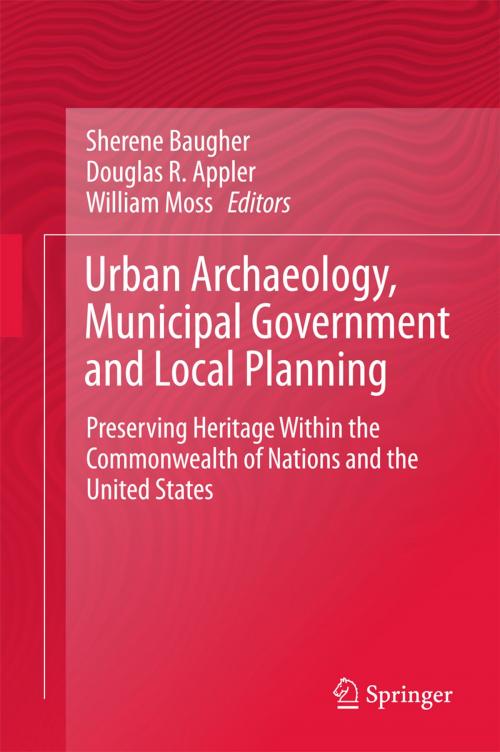Urban Archaeology, Municipal Government and Local Planning
Preserving Heritage within the Commonwealth of Nations and the United States
Nonfiction, Art & Architecture, Architecture, Planning, Social & Cultural Studies, Social Science, Archaeology, History| Author: | ISBN: | 9783319554907 | |
| Publisher: | Springer International Publishing | Publication: | July 28, 2017 |
| Imprint: | Springer | Language: | English |
| Author: | |
| ISBN: | 9783319554907 |
| Publisher: | Springer International Publishing |
| Publication: | July 28, 2017 |
| Imprint: | Springer |
| Language: | English |
Improving the relationship between archaeology and local government represents one of the next great challenges facing archaeology –specifically archaeology done in urban settings. Not only does local government have access to powerful legal tools and policy mechanisms that can offer protection for privately owned archaeological sites, but because local government exists at the grassroots level, it is also often closer to people who have deep knowledge about the community itself, about its values, and about the local meaning of the sites most in need of protection. This partnership between archaeology and local government can also provide visibility and public programing for heritage sites.
This book will explore the experiences, both positive and negative, of small and large cities globally. We have examined programs in the Commonwealth of Nations (formerly known as the British Commonwealth) and in the United States. These countries share similar perspectives on preservation and heritage, although the approaches these cities have taken to address municipal archaeology reveals considerable diversity. The case studies highlight how these innovative partnerships have developed, and explain how they function within local government. Engaging with the political sphere to advocate for and conduct archaeology requires creativity, flexibility, and the ability to develop collaborative partnerships. How these archaeological partnerships benefit the community is a vital part of the equation. Heritage and tourist benefits are discussed. Economic challenges during downturns in the economy are analyzed. The book also examines public outreach programs and the grassroots efforts to protect and preserve a community's archaeological heritage.
Improving the relationship between archaeology and local government represents one of the next great challenges facing archaeology –specifically archaeology done in urban settings. Not only does local government have access to powerful legal tools and policy mechanisms that can offer protection for privately owned archaeological sites, but because local government exists at the grassroots level, it is also often closer to people who have deep knowledge about the community itself, about its values, and about the local meaning of the sites most in need of protection. This partnership between archaeology and local government can also provide visibility and public programing for heritage sites.
This book will explore the experiences, both positive and negative, of small and large cities globally. We have examined programs in the Commonwealth of Nations (formerly known as the British Commonwealth) and in the United States. These countries share similar perspectives on preservation and heritage, although the approaches these cities have taken to address municipal archaeology reveals considerable diversity. The case studies highlight how these innovative partnerships have developed, and explain how they function within local government. Engaging with the political sphere to advocate for and conduct archaeology requires creativity, flexibility, and the ability to develop collaborative partnerships. How these archaeological partnerships benefit the community is a vital part of the equation. Heritage and tourist benefits are discussed. Economic challenges during downturns in the economy are analyzed. The book also examines public outreach programs and the grassroots efforts to protect and preserve a community's archaeological heritage.















